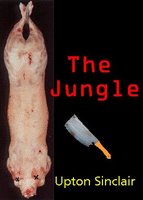 I read a couple of books recently that kept referring to Upton Sinclair's novel "The Jungle." Those books were "Fast Food Nation" by Eric Schlosser and "Don't Eat this Book" by Morgan Spurlock. These books were mainly books about the corruption and "unhealthiness" of the fast food industry. They all referred to the Meat packing industry where corruption still runs unchecked. "The Jungle" spurred some reaction from government when it was written because of the exposing of corruption and "unhealthiness" of the meat packing industry. The public outcry that resulted from this novel led to the 1906 Meat Inspection Act and the Pure Food and Drug Act. It also, however, led to a report issued the same year by the Department of Agriculture’s Bureau of Animal Husbandry that refuted the worst of Sinclair’s allegations. The public’s perception at this time was that the meatpacking industry feared these Acts. What was unrecognized, however, was the fact that meatpackers knew they were viewed with contempt, and facing substantial losses, the industry actually supported the Acts. They just did not want to be the ones to pay for the implementation. These Acts allayed most fears, and ironically, actually favored big business, which was the opposite of Sinclair’s intention.
I read a couple of books recently that kept referring to Upton Sinclair's novel "The Jungle." Those books were "Fast Food Nation" by Eric Schlosser and "Don't Eat this Book" by Morgan Spurlock. These books were mainly books about the corruption and "unhealthiness" of the fast food industry. They all referred to the Meat packing industry where corruption still runs unchecked. "The Jungle" spurred some reaction from government when it was written because of the exposing of corruption and "unhealthiness" of the meat packing industry. The public outcry that resulted from this novel led to the 1906 Meat Inspection Act and the Pure Food and Drug Act. It also, however, led to a report issued the same year by the Department of Agriculture’s Bureau of Animal Husbandry that refuted the worst of Sinclair’s allegations. The public’s perception at this time was that the meatpacking industry feared these Acts. What was unrecognized, however, was the fact that meatpackers knew they were viewed with contempt, and facing substantial losses, the industry actually supported the Acts. They just did not want to be the ones to pay for the implementation. These Acts allayed most fears, and ironically, actually favored big business, which was the opposite of Sinclair’s intention.Knowing that a novel could have such an impact, I had to read the book.
In "The Jungle" we follow a family of Lithuanian immigrants as they leave their country and set out to live the American Dream. Soon that dream is realized to be a nightmare. They are robbed by corrupt police upon their arrival in New York City and finally make their way to Chicago and to the stockyards where the main Character, Jurgis Rudkus has a friend that he has heard has "made it" in America. The friend runs a deli just outside of the stockyards where the families in the area all work at the stockyards. In order for any family to survive, as Jurgis finds out, all members must work, including children. They are taken on a tour of the stockyards all the way from the killing floors to the packing rooms. At first Jurgis is impressed by the speed and efficiency of the process. But once he begins work on the killing floor he sees and experiences all forms of corruption.
Jurgis and family are constantly followed by disaster, from Jurgis hurting his back and missing work to the death and disappearance of several family members. We follow Jurgis's plight as he is optimistic and willing to work to support the family, to being blacklisted from the stockyards, to "hoboing it," to a life of crime, to assisting in political graft and finally to becoming a voice for socialism.
Throughout the book nothing good ever seems to happen to Jurgis until (spoiler alert) he discovers Socialism. At this point the book becomes more of primer on Socialism and starts to become a series of philosophical discussions on the same.
Up until the discovery of Socialism the book is a heartstring tugging insight to the working man's world of the turn of the 20th century. The constant battles, struggles and disasters are enough to make the reader want to give all his earnings to the poor man. And serve as a great reminder of where this nation was 100 years ago.
I would normally tell you at this point to either enjoy the book or not to bother. It's hard to enjoy the hardships, but I think this should be a book to include in your must read list.
No comments:
Post a Comment